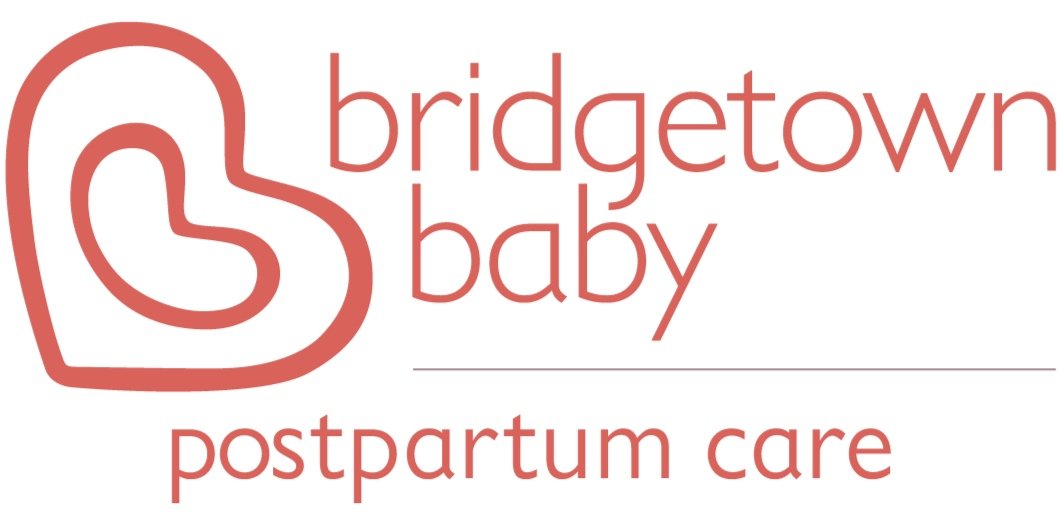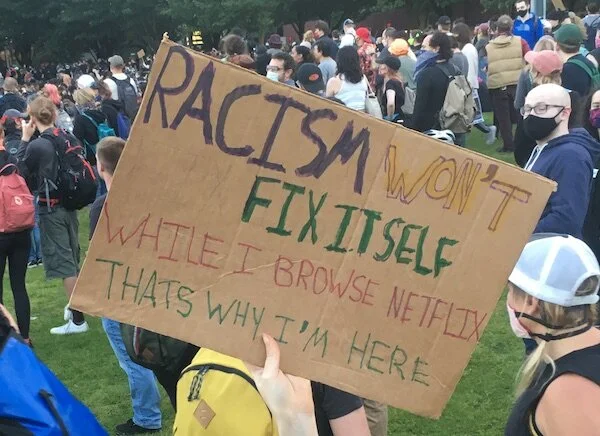Nourishing Young Readers: Diversify Your Child's Library
by Brita Johnson
As we participated in the marches following George Floyd’s murder last year, this was my favorite among the signs my 10-year old made - I loved the perspective she was able to take, because it was simple, but profound: things only change when we show up:
And when we, as parents, show up, we help our kids to do the same. When we strive to live anti-bias, anti-racist values, we give our children a powerful model to follow. That can feel like a lot of pressure, but as with so many things related to raising kids, finding resources and building community can grow our confidence and support us in parenting to our values.
It can help to start with a basic understanding of how biases form. Bias against those perceived as “other” or different is something that develops innately. According to HealthyChildren.org, “as early as 6 months, a baby’s brain can notice race-based differences. By ages 2 to 4, children can internalize racial bias.” These biases may become part of our children’s set beliefs, which are formed by around age 12 - the good news is that this “[gives us] a decade to mold the learning process, so that it decreases […] bias and improves cultural understanding.”
Like many families, particularly white families, we have a lot of work to do at home to unpack biases and engage in dismantling racism. For my family of readers, books are an important (and enjoyable) tool for recognizing and celebrating differences, fostering conversation about social issues, and building understanding.
A diverse library (purchased or borrowed) supports us in exploring and doing the work to counteract bias for ourselves and our kids. Books offer the opportunity for children to both see themselves and their experiences represented in the books they read and to step into the experiences of others who are different than them. Seeing others’ experiences in a new and relational light builds understanding and connection that interrupts bias and equips our kids (and us) to break the bonds of systemic racism.
Below are some resources to support your family in conversation, connection and cultivating a diverse reading experience. Just one more way that we nourish our children’s wellbeing and nurture the kind of culture shift that creates a world in which all of us can live and thrive.
More on Understanding Bias, the Role of Reading and Anti-Racist Parenting
Talking with Children About Racial Bias - HealthyChildren.org
Bridgetown Baby’s Round-Up of Tools For Antiracist Parenting
Using Books to Talk with Kids About Race and Racism - HealthyChildren.org
Anti-Racist Resources for Kids - ReadBrightly.com
How To Diversify Your Child’s Bookshelves - ReadBrightly.com
Help Your Kids Find Books With Diverse Characters - Common Sense Media
Book Sources
Books for Children and Teens about Race and Racism - Multnomah County Library
Books with Diverse Main Characters - ReadBrightly.com
Antiracist Children’s Books - TheConsciousKid.org
Third Eye Books Children’s Collection - black-owned bookstore in Portland
Antiracism Books for Kids - Powell’s Books
Finding/Supporting Community
Standing Up for Racial Justice
Oregon Children’s Theater Anti-Racism Resources for Families
Oregon Organizations Working on Racial Justice Issues
Brita Johnson is a Lead Doula with Bridgetown Baby. She lives in a book-strewn house in SE Portland with her family, including an 11-year old bookworm and a budding 6-year old reader.


